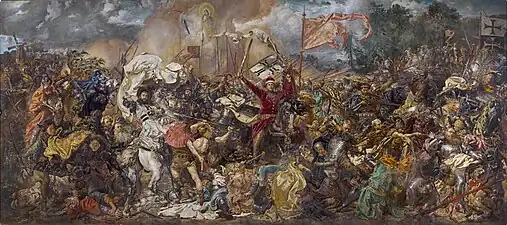1410
Year 1410 (MCDX) was a common year starting on Wednesday (link will display the full calendar) of the Julian calendar.
| Millennium: | 2nd millennium |
|---|---|
| Centuries: | |
| Decades: | |
| Years: |
| 1410 by topic |
|---|
| Arts and science |
| Leaders |
|
| Birth and death categories |
| Births – Deaths |
| Establishments and disestablishments categories |
| Establishments – Disestablishments |
| Art and literature |
| 1410 in poetry |
| Gregorian calendar | 1410 MCDX |
| Ab urbe condita | 2163 |
| Armenian calendar | 859 ԹՎ ՊԾԹ |
| Assyrian calendar | 6160 |
| Balinese saka calendar | 1331–1332 |
| Bengali calendar | 817 |
| Berber calendar | 2360 |
| English Regnal year | 11 Hen. 4 – 12 Hen. 4 |
| Buddhist calendar | 1954 |
| Burmese calendar | 772 |
| Byzantine calendar | 6918–6919 |
| Chinese calendar | 己丑年 (Earth Ox) 4106 or 4046 — to — 庚寅年 (Metal Tiger) 4107 or 4047 |
| Coptic calendar | 1126–1127 |
| Discordian calendar | 2576 |
| Ethiopian calendar | 1402–1403 |
| Hebrew calendar | 5170–5171 |
| Hindu calendars | |
| - Vikram Samvat | 1466–1467 |
| - Shaka Samvat | 1331–1332 |
| - Kali Yuga | 4510–4511 |
| Holocene calendar | 11410 |
| Igbo calendar | 410–411 |
| Iranian calendar | 788–789 |
| Islamic calendar | 812–813 |
| Japanese calendar | Ōei 17 (応永17年) |
| Javanese calendar | 1324–1325 |
| Julian calendar | 1410 MCDX |
| Korean calendar | 3743 |
| Minguo calendar | 502 before ROC 民前502年 |
| Nanakshahi calendar | −58 |
| Thai solar calendar | 1952–1953 |
| Tibetan calendar | 阴土牛年 (female Earth-Ox) 1536 or 1155 or 383 — to — 阳金虎年 (male Iron-Tiger) 1537 or 1156 or 384 |
Events
January–December
- March 25 – The first of the Yongle Emperor's campaigns against the Mongols is launched, leading to the fall of Öljei Temür Khan.
- March 29 – The Aragonese capture Oristano, capital of the Giudicato di Arborea in Sardinia.
- June 15 – Ottoman Interregnum: Süleyman Çelebi defeats his brother Musa Çelebi outside the Byzantine capital, Constantinople.[1]
- July 11 – Ottoman Interregnum: Süleyman Çelebi defeats his brother Musa Çelebi outside the Ottoman capital, Edirne.[2]
- July 15 – Battle of Grunwald (Žalgiris), also known as Battle of Tannenberg: Polish and Lithuanian forces under cousins Jogaila and Vytautas the Great decisively defeat the forces of the Teutonic Knights, whose power is broken.[3]
Date unknown
- Jan Hus is excommunicated by the Archbishop of Prague.
- Antipope John XXIII is elected.
- Construction begins on Castle Woerden in the Netherlands.
- The Prague Astronomical Clock (also known as Prague Orloj) is built by Mikuláš of Kadaň and Jan Šindel in Prague, the capital of the Czech Republic.[4]
Births
- January 30 – William Calthorpe, English knight (d. 1494)[5]
- July 14 – Arnold, Duke of Guelders, Duke of Guelders (1423–1465 and 1471–1473) (d. 1473)
- August 1 – John IV, Count of Nassau-Siegen (1442–1475) (d. 1475)
- date unknown
- Masuccio Salernitano, Italian poet (d. 1475)
- William Sinclair, 1st Earl of Caithness (d. 1484)
- probable
- Johannes Ockeghem, Dutch composer (d. 1497)[6]
- Ólöf Loftsdóttir, politically active Icelandic woman (d. 1479)
- Conrad Paumann, German organist and composer (d. 1473)
- Vecchietta, Sienese painter, sculptor and architect (d. 1480)
Deaths
- March 5 – Matthew of Kraków, Polish reformer (b. 1335)[7]
- March 16 – John Beaufort, 1st Earl of Somerset (b. 1373)[8]
- May 3 – Antipope Alexander V, (b. 1339)[9]
- May 18 – Rupert of Germany, Count Palatine of the Rhine (b. 1352)
- May 31 – Martin of Aragon (b. 1356)
- July 15 – Ulrich von Jungingen, German Grand Master of the Teutonic Knights (in battle) (b. 1360)
- August – Matthew I of Constantinople
- August 10 – Louis II, Duke of Bourbon (b. 1337)
- date unknown
- Margareta Dume, influential Swedish-Finnish noble
- John Badby, English martyr
References
- Kastritsis, Dimitris (2007). The Sons of Bayezid: Empire Building and Representation in the Ottoman Civil War of 1402-13. BRILL. pp. 149–150. ISBN 978-90-04-15836-8.
- Kastritsis, Dimitris (2007). The Sons of Bayezid: Empire Building and Representation in the Ottoman Civil War of 1402-13. BRILL. pp. 152–153. ISBN 978-90-04-15836-8.
- Knoll, Paul W. (1983). "In Search of the Battle of Grunwald. Review of Die Schlacht bei Tannenberg 1410, Quellenkritische Untersuchungen, vol. I: Einführung und Quellenlage by S. Ekdahl". The Polish Review. 28 (3): 67–76. JSTOR 25777993.
- Williams, Rhiannon (October 9, 2015). "Prague astronomical clock, the oldest of its kind, is 605 years old". The Daily Telegraph. UK. Retrieved October 9, 2015.
- Josiah Clement Wedgwood; Anne Holt (1936). History of Parliament...: 1439-1509. H.M. Stationery Office. pp. 149–.
- Brown, Howard Mayer; Stein, Louise K. (1996). Music in the Renaissance. Hoboken: Prentice Hall. p. 61.
- Phillip H. Stump (1994). "The" Reforms of the Council of Constance: (1414 - 1418). BRILL. pp. 14–. ISBN 90-04-09930-1.
- Sir Nicholas Harris Nicolas (1842). History of the Orders of Knighthood of the British Empire; of the Order of the Guelphs of Hanover; and of the Medals, Clasps, and Crosses, Conferred for Naval and Military Services. J. Hunter. pp. 384–.
- "Alexander (V) | antipope". Encyclopedia Britannica. Retrieved July 22, 2018.
This article is issued from Wikipedia. The text is licensed under Creative Commons - Attribution - Sharealike. Additional terms may apply for the media files.
